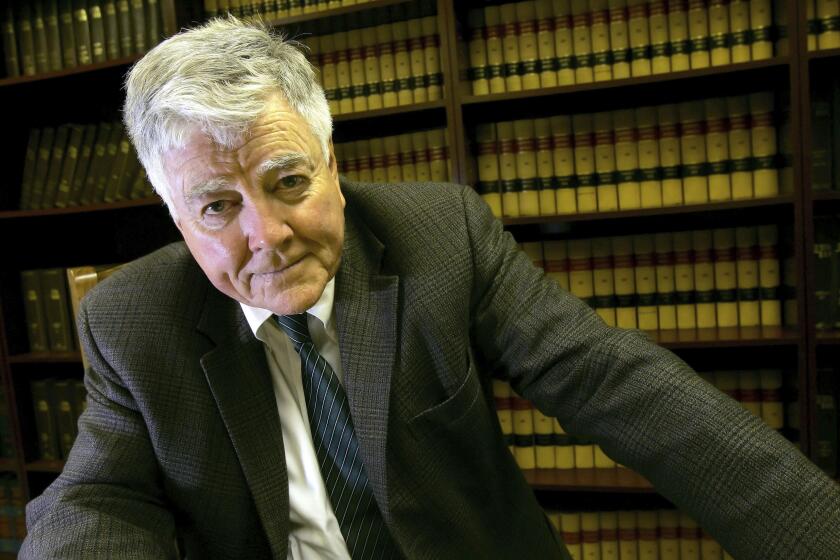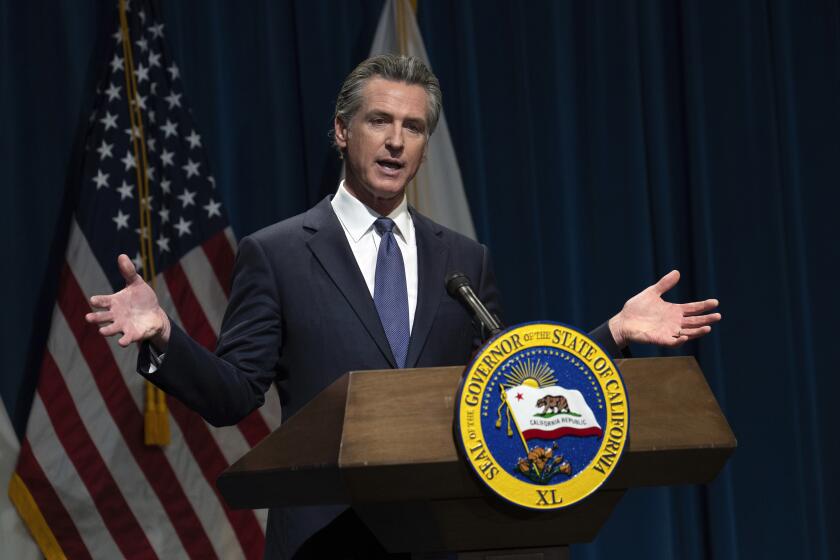Soviet Reformers Touring Country Seeking Recruits
While much of the Soviet Union appears to be daydreaming about Black Sea beaches or a dacha lost among the cool birches, Vladimir Lysenko and his comrades have set off by train, boat and plane on grueling journeys far off the beaten track, to places like Vladivostok and the sweltering Volga delta.
They’re not vacationing but trying to persuade as many members of the Communist Party as possible to defect and join their reformist group, the Democratic Platform. The party headed by President Mikhail S. Gorbachev, they claim, is now irretrievably lost to hard-liners and enemies of change, and they propose an alternative.
“They’re ringing us from all corners of the Soviet Union to ask that someone come from the Democratic Platform to explain our point of view,” said Alexander B. Zyabriev, a member of a full-time working group staffing the faction’s Moscow-based Coordinating Council. “So we go.”
Originally a radical opposition inside the party, the Democratic Platform is now striking out on its own to create a new, truly nationwide opposition party in the Soviet Union. If it manages that feat, it will be a first. But already there are problems.
For one, Democratic Platform delegates have split over whether the 28th Communist Party Congress held this month was a failure. And, according to the Soviet news agency Tass, 101 of the faction’s most influential supporters called on Communists to continue their fight for greater democratization by remaining in party ranks.
Then there’s the matter of image and leaders. High-profile allies like populist Boris N. Yeltsin, the president of the Russian Federation, and national lawmaker and Leningrad Mayor Anatoly A. Sobchak have turned in their Communist Party cards and distanced themselves from all parties, saying they must represent citizens of all persuasions.
That hardly magnifies the Democratic Platform’s lure for the country’s 18 million Communists, or the tens of millions of bezpartiny, their compatriots who belong to no party. Neither does the lack of a truly national medium, such as a widely available and frequently published newspaper, to disseminate the pro-reform, pro-market message.
To court support, “agitation groups” this week left Moscow, headed in three directions. The first, including Lysenko, a member of the Russian Federation’s legislature, flew to the Pacific port of Vladivostok, 5,700 miles to the east.
They originally planned a whistle-stop return on the Trans-Siberian railroad, riding in a swaying carriage for more than 4,700 miles on the wide-gauge line between Vladivostok and Sverdlovsk to pitch the Democratic Platform cause in 14 cities.
But they pondered that ordeal, friends said, and opted instead for Aeroflot.
Meanwhile, three more reformers were bound for Kazan, the historic capital of the Tatar khans, to cruise down the Volga to Astrakhan and seek converts in ports on the way. Two Democratic Platform officials also left by air for Kazakhstan to stump in that Soviet Central Asian republic.
One additional problem to show how hard it is to be a Soviet opposition politician, even in the Gorbachev age: The Democratic Platform had to send mostly elected Parliament members on the trips, because ordinary citizens have virtually no chance of getting plane tickets in the summer travel crush.
For the ex-Communist reformers to carve themselves a niche is going to be difficult, because there already exists what the weekly Moscow News has termed a “multi-colored palette” of fledgling parties--including Social Democrats, Russian Christian Democrats, just plain Democrats and Trotskyite sympathizers who call themselves the Marxist Workers Party (Dictatorship of the Proletariat).
So although Democratic Platform strategists have estimated that 3 million to 5 million Communists may quit the party this year, it will not necessarily be to their benefit.
“The situation is bad for the Democratic Platform, because it’s hard to get access to and recruit this uncontrollable outflow,” Zyabriev said.
Thus the “agitation groups” were formed, to link up with the Communist rank and file across the Soviet Union before a congress to formally create a new party is held this fall. On arrival in Vladivostok, Lysenko and other militants appeared this week on a radio show for sailors and fishermen in the waters off Soviet Asia, and they made speeches at a university and to representatives of mine workers, according to reports reaching Moscow.
The message was simple: The Democratic Platform is not trying to set up an anti-Communist party or a Communist party. Vyacheslav Shostakovsy, who announced the reformers’ walkout at the party congress, has said the goal is an “independent democratic parliamentary party.” He was immediately fired from his job as rector of the Moscow Higher Party School but has filed suit since to be reinstated.
“Defectors” may be a misleading label for those leaving, because they are not throwing out the wallet-sized cards that prove membership in the Communist Party. They are keeping them, to compute how much of the party’s vast real estate holdings, newspapers and other belongings like limousines and typewriters should, by right, be theirs if the party ever decides or is forced to relinquish them.
Until the results of the stumping expeditions are known, Democratic Platform leaders situate their power bases in the country’s two biggest cities, Moscow and Leningrad, and in Ural Mountain industrial centers like Sverdlovsk and Chelyabinsk. Coincidentally or not, they also have numerous followers in the Siberian city of Tomsk, where orthodox Communist Yegor K. Ligachev was the leading party official for 18 years.
National headquarters is a rearranged third-floor storage room at a Moscow film center and studio, not far from the city zoo or the U.S. Embassy. Small purple flags stuck in a wall map show Democratic Platform followers from the Kamchatka Peninsula, across the Bering Sea from Alaska, all the way to Uzhgorod on the Czechoslovak border.
Seated by a desk near the window, a man from Moscow’s Sokolniki district argues politics with Zyabriev and asks an all-too-typical question: “I’ve already decided to quit the Communist Party, but why should I join up with you people?”
Finding a persuasive answer is the reformers’ most important task. “There are broad masses who in their heart of hearts share the approaches of the Democratic Platform, but our leaders say they have almost no contact with them,” Zyabriev said. “We must reach them.”
More to Read
Start your day right
Sign up for Essential California for news, features and recommendations from the L.A. Times and beyond in your inbox six days a week.
You may occasionally receive promotional content from the Los Angeles Times.






